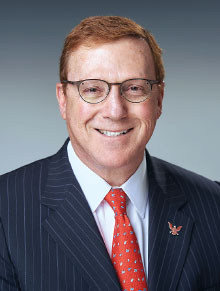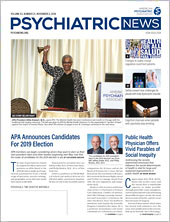A bill passed last month by Congress takes important steps toward combating the opioid crisis with a broad range of treatment and prevention programs, APA said in a statement.
“Opioid use disorder has taken a heavy toll on the health and well-being of Americans,” said APA President Altha Stewart, M.D. “APA is grateful to see bipartisan support for increased access to treatment for substance use disorders [SUD], including expanded access to residential treatment and medication-assisted treatment.”
Passing the Senate 98-1, the opioid legislation—The SUPPORT for Patients and Communities Act (HR 6)—combines 70 separate bills from Republicans and Democrats into one package. As of press time, the legislation was awaiting President’s Trump signature.
One year has passed since President Trump declared the opioid epidemic a national emergency, yet overdose deaths continue to climb, surpassing 72,000 in 2017, according to the latest provisional government estimates. That number represents a nearly 10 percent increase from the previous year.
APA was disappointed, however, that the legislation failed to include a revamp of a federal regulation known as 42 CFR Part 2. The measure would have allowed for improved information sharing among clinicians by giving them full access to patients’ SUD treatment records. Stewart said it would have allowed for better care coordination, improved patient safety, and reduced stigma, while still preserving patient confidentiality. The changes would have brought SUD treatment into alignment with the Health Insurance Portability and Accountability Act (HIPAA) and were contained in the OPPS Act (HR 6082), which passed the House with strong bipartisan support earlier this year.
“We urge the Senate to hold a separate vote on the OPPS Act to ensure that these reforms become law,” Stewart said.
HR 6 includes a number of provisions for which APA had lobbied, including the following:
•
Telemedicine: For the treatment of Medicare patients with SUD, the legislation eliminates telehealth facility fees and waives certain geographic requirements. The legislation also directs the Attorney General to issue final regulations within one year specifying the circumstances in which a special registration to use telemedicine to treat SUD may be issued and the procedure for obtaining a special registration.
•
Parity for children: Coverage of mental health and substance use disorder services is mandated for the 9.4 million children from low-income families enrolled in the State Children’s Health Insurance Program.
•
Workforce investment: A new student loan repayment program has been created for SUD treatment providers (up to $250,000 per individual) who agree to serve for six years in underserved areas or areas with higher-than-average overdose rates.
•
Pain management: The legislation supports innovative medical research at the National Institutes of Health to combat the opioid crisis.
•
Transition from prison: The legislation requires that a stakeholder group be convened to develop best practices for ensuring continuity of care for inmates transitioning from incarceration.
The legislation also lifts the ban on states from using Medicaid funds to treat SUD patients in larger residential facilities. States will now be able to amend their plans to cover institutional SUD treatment for up to 30 days per patient in a 12-month period.
The legislation also allows certain physicians who provide medication-assisted treatment (MAT) to treat more patients. Specifically, physicians who are board certified in addiction medicine or addiction psychiatry who obtain a waiver may treat up to 100 patients with MAT. The previous patient limit was capped at 30 patients the first year after obtaining a waiver.
The opioid package has been criticized for not providing the level of funding needed to thwart the opioid epidemic. In a separate measure, Congress approved its Fiscal 2019 appropriations package, which provided $3.8 billion for the opioid crisis, a $206 million increase from 2018 funding levels. ■
APA’s statement on the opioid legislation
here. The text of HR 6 is available
here.

